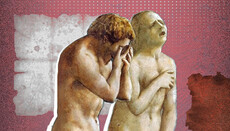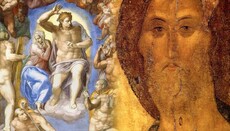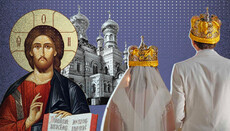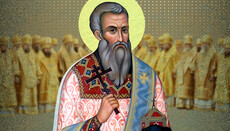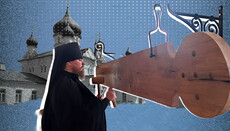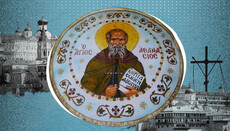“Picasso”: Friendship and Neophyte Zeal
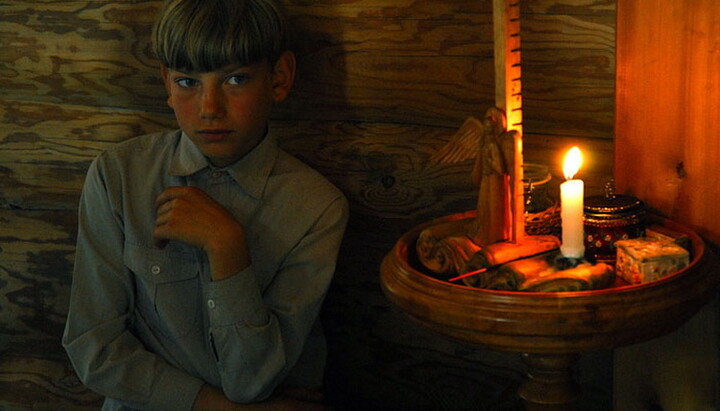
Excerpts from A. Vlasov’s book Picasso. Part One: The Slave. Episode 4.
Timeframe: 1989
Place: Kyiv
Characters: Misha Kaminsky and Georgiy, both fourteen
Around this time, in the regal city of Kyiv, altar boy Misha Kaminsky found himself in the same predicament as that fifth-grader whom Kirill, Red-haired Gena, and the rest had once roughed up and robbed. Yet from that trouble he gained a friend—a true friend.
For about a year now, a boy Misha’s age had been appearing at their church: a slight, short lad named Georgiy. It was the season when young people were slowly finding their way into church. Against the backdrop of grandmothers—and the occasional grandfather—this youth looked almost startling. Of course, there had always been children and teenagers in church, but mostly those whom those very grandmothers and grandfathers had led there since infancy.
Those kids were born and raised in believing families; they went to church not out of inertia exactly, but because they could not imagine life otherwise. After the grand millennium celebrations of the Baptism of Rus’, however, boys and girls began arriving from ordinary, unbelieving Soviet homes—drawn by the heart’s call… or God’s. Hearing that call, they started attending services, pushing past their parents’ incomprehension and, at times, open hostility from relatives and friends. They embraced spiritual life with youthful absolutism: if you believe, then enough to move mountains; if you pray, then so that God must hear; if you give alms, then down to your last shirt.
These were the very people who, in the early nineties, would fill hundreds of monasteries rising from the ashes and become pastors in thousands of village parishes.
Such a one was Georgiy. One day he slipped in near the end of a service. Two weeks later he came earlier. Soon he was there for every service, arriving before the start and leaving among the last. He bought and devoured every spiritual book that appeared at the candle desk. He spoke often with the priest. In time, he helped clean the church and gradually came to know Misha.
One Sunday they were walking home after the Liturgy. They took the tram together as far as Shevchenko Square, where Georgiy changed to a trolleybus and Misha continued on foot. They waved good-bye when Georgiy had already boarded. Misha had barely taken a few steps from the stop when a voice came from the side:
“Got a light?”
“I don’t smoke,” he said, and tried to keep going, but two guys blocked his way.
“Hold up, kid. No hurry.”
Misha felt the air turn.
“I need to get home… I said I don’t smoke.”
He tried to pass, and they shoved him back.
“Don’t get smart. We just need to ask you something, then you can go.”
Misha glanced around. Three older teens and one little first-grader were hemming him in. The first-grader’s face was as mean and nasty as the others’.
“Don’t be scared,” the oldest said, jerking a thumb at the little one. “We’re looking for a guy who robbed my kid brother here yesterday, right about this spot.”
“No, not me. I wasn’t here yesterday,” Misha said, feeling a loosening in his chest. A mix-up—surely they’d let him go.
“My brother says you look like him,” the older boy went on, while the first-grader nodded vigorously. “Don’t take offense—if it’s not you, you can go. But we have to check. They took his wallet. Brown leather. If we find it on you, you’re dead.”
“No, mine’s black,” Misha said, reaching into his pocket.
He’d been given a plain wallet at the start of ninth grade.
One of the boys grabbed his wrist. “What are you doing? Not out here—people will think we’re mugging you. Let’s step inside.” He jerked his head toward a big apartment block fifty meters away.
They took Misha by the arms and walked him into the entryway, up one flight. Then they formed a ring around him.
“Empty your pockets.”
Misha produced the wallet, which they snatched at once.
“Give it back!” Misha blurted. “It’s not brown!”
“Keep going. We said if it’s not you, we’ll let you go.”
He pulled out a handkerchief, a pencil eraser, a few odds and ends.
“Well? Is it him?” one of the teens asked the first-grader.
The little one shook his head.
“Alright, beat it,” they told Misha. “Our mistake.”
“Then… the wallet. Give it back.”
“What wallet? What are you babbling about?”
“My wallet! Where is it?” Misha looked from face to face; the three were grinning, showing him empty hands.
“Give it back!”
“You nuts? Get lost. Nobody took your wallet.” They shoved him in the chest. “Go on!”
Just then the door flew open and Georgiy bounded up the stairs, out of breath. From the trolleybus window he had seen Misha in trouble, jumped off at the next stop, and run back, checking several entrances before he found him.
A few minutes later, he and Misha were sitting on the steps with bloody noses, bruises, and scrapes—and, of course, without Misha’s wallet. The pack of thugs had handed out a few blows and vanished.
That day their real friendship began.
After the Feast of the Protection of the Mother of God (Pokrov), October 14 by the new calendar, the servant of God Georgiy—by then a young reader on the kliros at the Puscha-Voditsa church in Kyiv—stunned his rector and spiritual father, Father Alexander, with a pronouncement:
“My parents are living in fornication.”
“How so?” the priest asked, surprised. “Both at once?”
It was unusual for husband and wife to be carrying on in parallel affairs. Further conversation revealed Georgiy meant simply that his parents were not married in church. Father Alexander’s shoulders relaxed.
“Yura, you’re being too formal,” he said. “A church wedding—yes, it’s a sacrament. God’s blessing is bestowed on married life. But… even if a marriage is not blessed in church for some reason, if husband and wife live as a family and are faithful to each other, that is not fornication.”
“Then what is it?”
“A real family.”
“I disagree,” Georgiy said with the categorical certainty of a fourteen-year-old.
Father Alexander allowed himself the faintest smile and went to the candle desk for a Bible.
“Look,” he said, opening to Genesis 2. “Here is the account of the first marriage on earth—and not merely on earth, but in Paradise.” He raised a forefinger. “ ‘And the Lord God made a woman from the rib He had taken from the man, and brought her to the man. And the man said: This is now bone of my bones and flesh of my flesh… Therefore shall a man leave his father and his mother and be joined to his wife, and they shall be one flesh.’ Notice: in this marriage rite God says nothing at all. The one speaking is the man. He names the woman his wife—and the marriage is made. So, if there is such a public declaration—this is my wife—whether at the civil registry, at a wedding feast, or in church, that is marriage.”
He fell silent, watching Georgiy’s face. The boy said nothing, but it was clear the argument had not persuaded him.
“Or take the Apostle Paul,” Father Alexander continued, turning pages. “First Corinthians: ‘To the rest speak I, not the Lord: If any brother has a wife who does not believe, and she is pleased to dwell with him, let him not put her away; and the woman which has a husband that believes not, and if he be pleased to dwell with her, let her not leave him.’ The apostle shows that the Church recognizes even pagan—i.e., purely civil—marriage, so long as husband and wife keep its holiness and indissolubility. Where is the fornication there?”
But Georgiy would not yield. “Yet the apostle says, ‘I, not the Lord…’ ”
“Are you suggesting the Apostle Paul would speak anything contrary to the will of God?”
No, Georgiy could not claim that. But he still balked at the notion that one might live in a non-church wedding.
“Besides,” said Father Alexander, “these days it’s no problem at all. Go to church and be married—no party consequences anymore; the churches are open, priests are here. Or do your parents refuse?”
“Father won’t. Mother… well, she would agree,” Georgiy muttered, lowering his head.
“Then your father isn’t ready yet. He needs time—and gentle explanation. Unforced, with love.”
“I told him I’ll leave home if they don’t get married in church!” Georgiy burst out.
Again the priest smiled faintly and shook his head. “No, brother. By such scenes you won’t bring your parents to the Church—you’ll drive them from it. Be an apostle in your own household. Teach them the basics of faith, gently, without pressure. Do you have siblings?”
“A younger brother.”
“Good. Then take a page from the Apostle Paul,” Father Alexander said, flipping again. “Here: ‘While Paul waited for them at Athens, his spirit was provoked within him when he saw that the city was given to idols.’ Imagine—idolatry everywhere, mortal sin! But how does he address the Athenians? ‘Men of Athens, I perceive that in all things you are very religious.’ He even begins by commending them, in a way. Then he proclaims Christ: ‘For as I passed by and beheld your devotions, I found an altar with this inscription, To the Unknown God. Whom therefore you ignorantly worship, Him declare I unto you.’ Now imagine if he had started: ‘You vile idolaters! Hell awaits you! Repent before it’s too late!’ Would they have listened? So, brother, temper your zeal. Show your parents first of all a son’s love and obedience. In time they will enter the Church.”
He returned the Bible to its place, blessed Georgiy, and, with a shade of sternness, added:
“Do not run away from home.”
Georgiy did not run away. But he practically dragged his father to the altar to be crowned, hand in hand: if it must be done, then it must—no compromises.
To be continued…
The previous episode of the book is available here.
